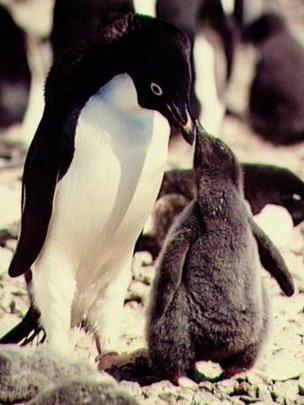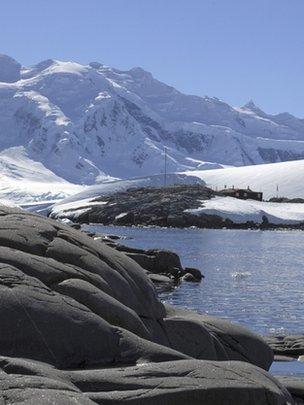Decision looms on future for British polar research
- Published
- comments

The Antarctic is a place of mesmerising beauty
Press reports say the world famous British Antarctic Survey is doomed. A petition to save Britain's polar heritage does the rounds. Captain Scott must be turning in his icy grave.
If any of this is right? Beneath the smoke, how much fire can be found?
As with any plan for cuts in public spending, there is a swirl of confusion, resentment and rivalry amid a genuine fear about jobs.
Throw in a proposed merger of one proud institution with another - in this case, the British Antarctic Survey with the National Oceanography Centre - and you fuel the flames.
But this is more than a story about budgets and a forced and unpopular bureaucratic marriage.
It raises questions that range from the pragmatic - like how best to run British research ships - to the fundamental, like Britain's future ability to conduct polar science and its capacity to take a leading role in investigating some of the great environmental questions of our time.
And it even goes beyond that to geopolitics, to an Antarctic equivalent of the "great game" that was played out a century ago in Central Asia, where every pin on a map has diplomatic value, where national interest requires that Union Jacks continue to endure the gales of the last unclaimed continent on Earth.
Special place
Any sort of threat to the British Antarctic Survey (BAS) was always bound to strike a chord. Antarctica holds a special place in British hearts. Inspired a century ago by the legends of Scott and Shackleton, this mix of awe and affection has been nurtured by imagery of the extraordinary wildlife, most recently in the landmark series Frozen Planet.
So what's really on the cards for the organisation and the people that sustain Britain's presence down South?
The blueprint that has caused the furore is laid out in a consultation document, external drawn up by the Natural Environment Research Council (NERC), the body which provides the funding for BAS, in the region of £48m a year.
In brief, the proposal is to create a single centre for marine and polar science, pooling the scientists and administrative staff of BAS in Cambridge with those of the National Oceanography Centre in Southampton, working 'from coast to deep ocean and pole to pole'.
The science would be organised by themes, the headquarters would be in Southampton, and the two research vessels run by BAS would join those of NOC in a single fleet, also run from Southampton.
No wonder the staff of the British Antarctic Survey are feeling bruised - "pretty irked" as one told me.
First question: will the name of the institution survive the merger?
The planning document explicitly recognises how BAS is an 'international brand' which is 'likely to be beneficial' in future. One reason is that in collaborations with other countries' polar science organisations, it helps to have a clearly recognisable body with which to deal.
Another is that the name 'British Antarctic Survey' is seen to have diplomatic value too - I understand that the Foreign Office, keen to maintain Britain's profile in the South Atlantic and Antarctica, has been firm on that.
So, it's hard to imagine the name disappearing. The BAS brand will continue, though within the new centre.
What is their role?
But that raises the next obvious question: if the scientists and admin staff of BAS are supposed to merge with those of the NOC, what will that leave BAS to actually do?
Again, the merger document spells it out: the BAS site at Cambridge would be 'the focus' for all polar logistics, operations and engineering including the Antarctic research stations and aircraft.
To outsiders, the British presence in Antarctica looks set to remain under the banner of the British Antarctic Survey. Internally, BAS becomes a department of the new marine and polar centre.
The background, as with all public sector bodies, is that the Natural Environment Research Council is seeing its budget of nearly £300m shrink under the current spending round.
NERC spends the money on a range of projects from plant biology to sustainable food production to earthquake research so polar science has to fight its corner.
In the last spending round, BAS did better than most but nothing about work in the polar regions in easy, so nothing comes cheap either. Supplies to the bases need to be brought in by ship, at a cost of roughly £10m a year, much of that spent on fuel.
Personnel need to be ferried in by plane - in 2006 I joined one of the flights, external from the Falklands to Britain's largest Antarctic base at Rothera.
Smaller planes are then needed to get scientists into the field. All of these big-ticket items come with a hefty bill.
More collaboration
What is not clear is how much will be saved by the merger itself. Probably not a great deal, amid the turmoil of reorganisation.

Britain has always taken a lead in Antarctic research
And that is accepted by NERC, which instead says the primary motive is making the overall science effort more effective by creating 'synergies' between the marine researchers and the polar people - bluntly, getting them to collaborate more routinely and scheduling the four ships more coherently.
Examples include studying the 'coupling' of ice and ocean to better understand sea level rise; identifying climate 'tipping points'; investigating the flows of carbon between polar and sub-polar sinks and sources.
The argument is that while BAS science has yielded the discovery of the ozone hole and other important findings on the glaciers and biology of the Antarctic Peninsular, the future lies in collaboration.
The plan to drill through, external the Antarctic ice-sheet to sample the hidden waters of Lake Ellsworth in December involves BAS and NOC and other bodies and is led by a professor from Bristol University.
A huge research effort to investigate the mighty Pine Island Glacier in West Antarctica, feared to be one of the most vulnerable to ocean warming, also includes a host of organisations with BAS playing a prominent role.
Falklands row
But behind the science, another force is at work. The Foreign Office is watching this process closely, scrutiny that became more intense during the recent flare-up with Argentina over the Falkland Islands.
BAS flies the flag at no fewer than four sites in Antarctica and one on South Georgia. Under the Antarctic Treaty, all territorial claims are put on hold; the primary activity allowed is science.
That is fine as long as science funding is steady, less so when budgets are tightened. If this spending round is causing tension, imagine what the next one might do? How strong is the science case for maintaining such a large physical presence down South?
If research money is better spent elsewhere, like the fast-changing Arctic for example, who should pay to keep the southern bases going? Expect some awkward Whitehall struggles ahead.
Nobody likes change and mergers can be the worst. I recall reporting on the bitter fighting in the early 1990s over plans to combine army regiments, many of them centuries-old and rightly proud of long lists of battle honours.
Right now the British Antarctic Survey is preparing to send off about 150 scientists and personnel for the regular summer research season.
Amid the mesmerising beauty, the work will be intense. But this time people will also be keeping an ear out for some crucial news from distant Britain. The decision on the merger, and precisely what it will mean for BAS and for them, is due in December.